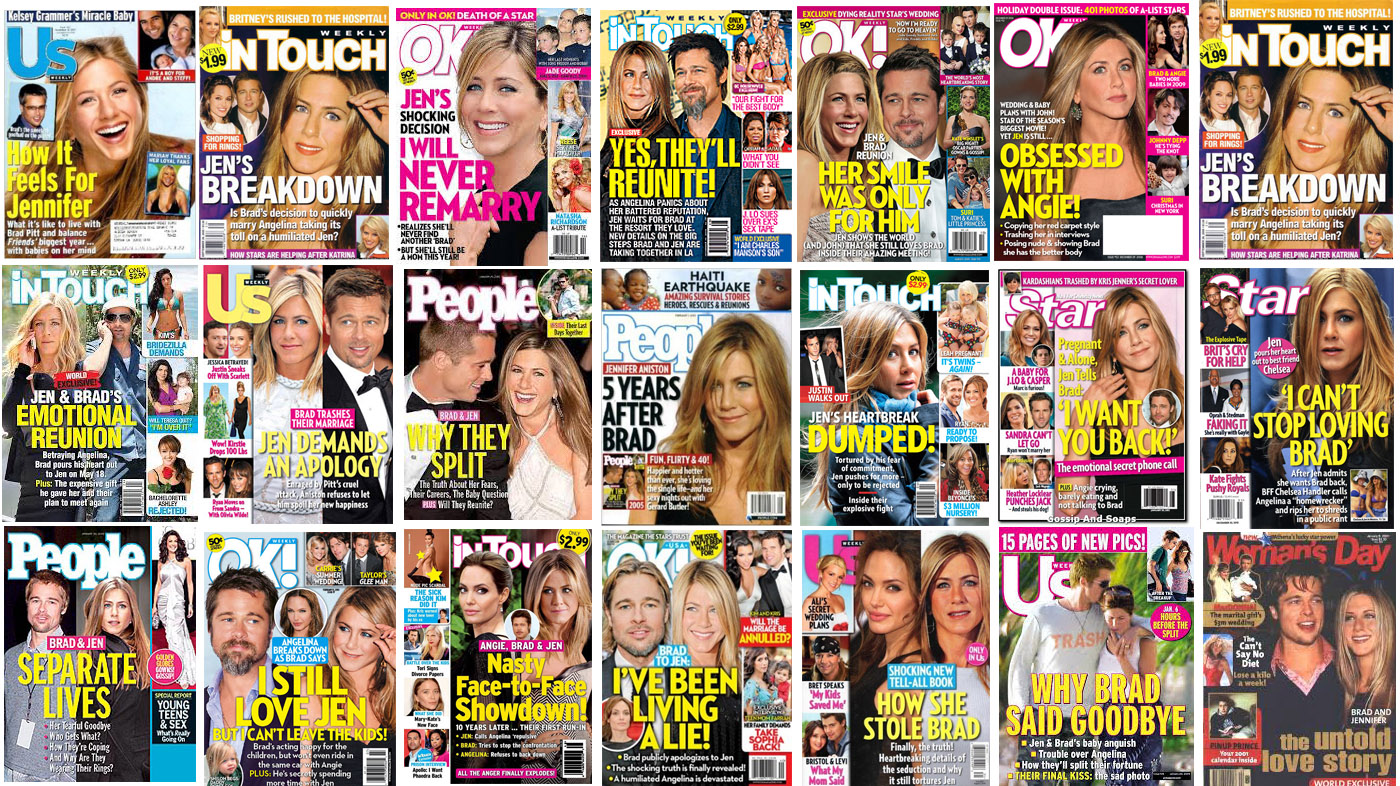Why you should care that Frank Bruni asked Jennifer Aniston about Brangelina
It points right to Hollywood's gender gap


A free daily email with the biggest news stories of the day – and the best features from TheWeek.com
You are now subscribed
Your newsletter sign-up was successful
Brad Pitt left Jennifer Aniston for Angelina Jolie 10 years ago. Somehow this is still news.
From People to The New York Times, Aniston is still regularly compared to, and asked about, Jolie. Even the Times' columnist Frank Bruni couldn't resist. "It's ridiculous — that the two names have to go into the same sentence and there has to be a compare-and-despair thing," she told him in a recent profile. It's "... just tiresome and old," she told ET in a separate interview.
Amen.
The Week
Escape your echo chamber. Get the facts behind the news, plus analysis from multiple perspectives.

Sign up for The Week's Free Newsletters
From our morning news briefing to a weekly Good News Newsletter, get the best of The Week delivered directly to your inbox.
From our morning news briefing to a weekly Good News Newsletter, get the best of The Week delivered directly to your inbox.
The fact that she still needs to make such comments suggests that we should all be ashamed of ourselves. But it also points to a deeper — dare I say, more interesting — insight into how we treat actresses.
Our assumed intimacy with female celebrities makes us feel like they are pals, not people doing a job. Yes, being a public figure is part of that job, but there is a massive disparity between how much celebrity men are supposed to play this role and how much celebrity women are.
Actress Sienna Miller illustrated this perfectly in a recent interview in Variety. When asked about how hard it is to be a 20-something actress, she replied, it's "completely sexist," "imbalanced," and "insane."
I had an experience with The New York Times, where my ex-boyfriend Jude was doing a play on Broadway. They did a profile on him, and during the article referred to the fact that he had a relationship with me. The following week, the same newspaper did an article on me and referred to Jude as "a fling." As if I was promiscuous, and all the connotations that come with that word. That's sexism in the upper echelon of journalism. [Variety]
A free daily email with the biggest news stories of the day – and the best features from TheWeek.com
And it doesn't get any better once a woman gets married. Instead, the focus just shifts from her love life, to her life as a mom. Last year Jennifer Garner recounted how she and her husband Ben Affleck compared notes after a day spent at press junkets. "I told him every single person who interviewed me — and I mean every single one… asked me: 'How do you balance work and family?'" Garner said. Affleck replied that he had not been asked that question once.
This is actually a serious problem.
When journalists focus so much on the personal in their coverage of female celebrities — and I am not talking about the tabloids here, but more credible outlets like the Times — they are doing it at the expense of hearing more about the women's work. This plays into the systematic devaluation of women in Hollywood, where women are paid less to act and rarely receive funding to take control behind the camera.
There is no shortage of evidence here. Just look at how Amy Adams and Jennifer Lawrence were both paid less than their male co-stars — yes, even Jeremy Renner! — in American Hustle. Or how Columbia Pictures pays its female co-CEO a million dollars less than the male co-CEO — despite them literally doing the same job, at the same time. Or how only 2.4 percent of all Best Director nominees at the Oscars over the last 25 years have been women.
More transparency will clearly help fight this bias — as was the case with the Sony Hacks — but so will reining in our insatiable curiosity to uncover every detail about a female celebrity's personal life. It's only natural that if we continue to think of women as personalities first, professionals second, we will value their professional output less.
So here's a promise: Next time I write about Jennifer Aniston, I'll lead with her latest indie turn, not Brangelina.
Elissa Strauss writes about the intersection of gender and culture for TheWeek.com. She also writes regularly for Elle.com and the Jewish Daily Forward, where she is a weekly columnist.
-
 Film reviews: ‘Send Help’ and ‘Private Life’
Film reviews: ‘Send Help’ and ‘Private Life’Feature An office doormat is stranded alone with her awful boss and a frazzled therapist turns amateur murder investigator
-
 Movies to watch in February
Movies to watch in Februarythe week recommends Time travelers, multiverse hoppers and an Iraqi parable highlight this month’s offerings during the depths of winter
-
 ICE’s facial scanning is the tip of the surveillance iceberg
ICE’s facial scanning is the tip of the surveillance icebergIN THE SPOTLIGHT Federal troops are increasingly turning to high-tech tracking tools that push the boundaries of personal privacy
